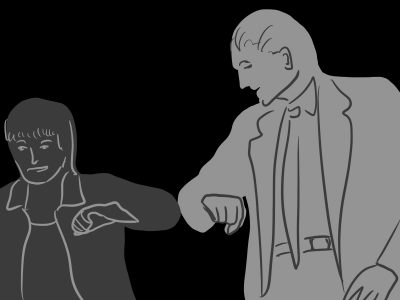As mass vaccinations begin to rollout in earnest, we’ve all been dusting off our concert sneakers, bathing suits and picnic blankets in preparation. Many of us even have a post-quarantine bucket list at the ready, poised to check off all the adventures we put on hold over the last year.

Finally, freedom is within reach.
But we’re not out of the woods yet. After a year of isolation, anxiety and even trauma, there’s no telling if we’ll ever return to our “normal.” The pandemic has deeply impacted each of us in vastly different and individualized ways.
Exiting the pandemic won’t be like turning off a switch. Antibodies are temporary and fleeting, and vaccines don’t protect against asymptomatic infections or mitigate the risk of you becoming a carrier, so we still have to exercise caution.
It will be a gradual process. Even after states reopen and the majority of the country is inoculated, we’ll probably have to wear masks — if not out of legal requirement, then out of courtesy.
Yet in such a fractured country, we have struggled across leadership and within families to be on the same page. The same dissonance will most likely be amplified in the coming year.
You may be looking forward to socializing, being physically affectionate and going to loud, crowded parties. Your friend, however, may no longer be comfortable doing the same.
You may think the pandemic will be over, its impact wiped clean from society’s slate, as soon as you get your vaccinations. Your friend may expect another year of restricted life.
Navigating the social politics and friction between clashing opinions, especially if it’s with a loved one — or worse, a friend you’re not comfortable enough confronting — was hard enough when masks and social distancing were the point of contention.
Our relationship dynamics have drastically shifted, if not been altogether lost: Interactions with our outer circle — those who fall into the middle ground between acquaintances and close friends — have been reduced to the occasional slide up on their Instagram stories.
The tentative, unestablished friendship with the classmate you were in the middle of platonically wooing last Spring has been put on pause indefinitely because the pandemic has reduced our energy and capacity to socialize.
Perhaps most heart-wrenching, however, has been the loss of long-term relationships.
How people have behaved and handled the pandemic has been incredibly enlightening. It’s telling if a friend — or former friend — has been travelling or unnecessarily coming in close contact with other people, showing a blatant disregard for public health and the safety of others.
These red flags would never have been brought to the surface without COVID-19.
Relationships that we haven’t yet cut off may be strained as well. Even if we don’t break any of the guidelines, many of us may still bend them. Some assume that with people they’re comfortable being around, it’s OK to take off the mask. For college students who share the same campus and testing procedures, this belief is even more common.
It’s hard to constantly set our priorities straight. It’s hard not to succumb to peer pressure or even familial pressure, to not be seduced by the temptation and promise of human connection.
COVID-19 fatigue has also lent itself to more relaxed attitudes. In some cases — for example, not being able to visit family who may be struggling — the cognitive dissonance between loneliness, wanting to help and health risks can be too much to bear.
But this also means we’ve been given an opportunity to re-evaluate more artificial friendships — ones that wouldn’t be able to withstand disagreement or questioning.
Some have lost friendships and others have gained them. Some have made unexpected friendships arise or old friendships resurrect as a result of taking that first step to check in.
The common denominator is: If they’re a true friend, they will recognize that wearing a mask says, “I respect you and want to keep you safe,” and not, “I don’t trust you.” The people who are left in your life should put your health, safety and comfort first.
COVID-19 has also changed how we view consent. Previously, it may have been normal to hug without a second thought or without asking the recipient if they were comfortable with physical affection. Now, the virus has emphasized the importance of being considerate.
The move from in person to virtual has changed the nature of our interactions as well, helping us stay in touch with those we’re comfortable reaching out to. Platforms such as Teleparty, Houseparty and Zoom will continue to be relevant after the pandemic, perhaps more so than they were before — after all, this experience has highlighted the necessity of connection and communication.
On a purely social front, returning to normal life may be weird or awkward. There will be growing pains: relearning how to do small talk, the etiquette of in-person conversation and other since-forgotten skills. For some, this may be harder than others.
In times of crisis, nothing beats finding people you can lean on and commiserate with. The COVID-19 pandemic has showcased who our true friends are, taught us how to deal with interpersonal conflict and reminded us to be mindful of others.
Emerging from this year-long horror show, we can only hope we’re surrounded by trust and respect from others. On a societal level, we must integrate the lessons of not only hygiene and medical communication but also boundaries and consent into our post-pandemic culture.















Beautifully written.